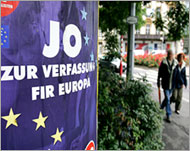Luxembourg approves EU constitution
Luxembourgers have approved the European Union’s troubled constitution in a referendum, averting the threat of Prime Minister Jean-Claude Juncker’s resignation.

Voters in the duchy of 465,000 people that houses several key European Union institutions backed the charter by 56.45% to 43.55% , with results from 93.5% of the constituencies coming in on Sunday.
The result, if confirmed by official figures, is unlikely to revive the charter, designed to make EU decision-making more efficient after the bloc’s enlargement last year, after it was rejected in French and Dutch referendums.
But it will allow veteran EU leader Juncker to keep his jobs of prime minister, finance minister and chairman of euro group of 12 nations sharing the euro currency, while strengthening his already considerable clout in the 25-nation EU.
Juncker, 50, had decided to go on with the referendum and kept his promise to quit if the constitution was rejected, although the June EU summit agreed on a long period of reflection on the constitution after the two failed referendums.
Little hope for EU
 |
|
The charter can go ahead only if |
The summit’s decision has prompted the majority of EU members, yet to ratify the treaty, to postpone or suspend the process. The charter has been ratified by 12 countries, the latest being Malta.
Juncker said last week that Luxembourg’s “Yes” would offer a glimmer of hope for the constitution despite its rejection in France and the Netherlands, but most politicians and analysts believe the charter is already dead.
“You cannot have the constitution without France,” said Daniel Gros, director of the Centre for European Policy Studies, a Brussels-based think tank.
The charter cannot go ahead unless it is ratified by all 25 member-states, either in a referendum or parliamentary vote.
Juncker, who has served 11 years as prime minister, has betted his career on the referendum, saying a closer EU integration is needed to prevent the bloc from sliding into national rivalries that had once resulted in the second world war.
Winning argument
An architect of the euro currency, he has evoked, during the campaign, the wounds his father had suffered during the war when he was forcibly recruited to the German army.
Similar arguments, however, had fallen on deaf ears in France and the Netherlands, where voters appeared to be more preoccupied with stagnant economies, threats of globalisation and fears of further EU expansion into countries such as Turkey and Ukraine.
The Grand Duchy, surrounded by Germany, France and Belgium, and a founder member of the EU, has benefited politically and economically from the post-war drive for unity in Europe.
It is Europe’s richest country in terms of gross domestic product per head – 52,600 euros a year, twice that of Germany and France – thanks to its flourishing banking sector.
A deeply Catholic country, the prospect of Muslim Turkey joining the EU has been used by the “No” campaigners as it was in the French and Dutch referendums by the right.
Juncker’s success at the referendum is certain to be greeted with relief by many European leaders who admire the wily negotiator for his wry sense of humour.